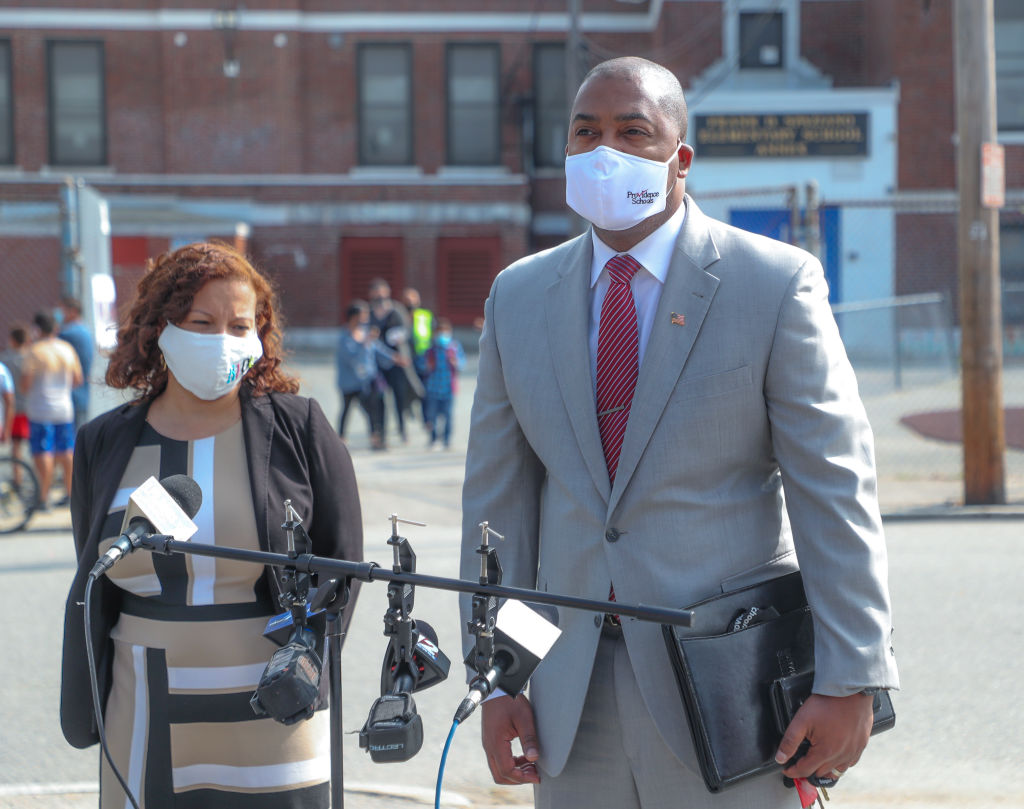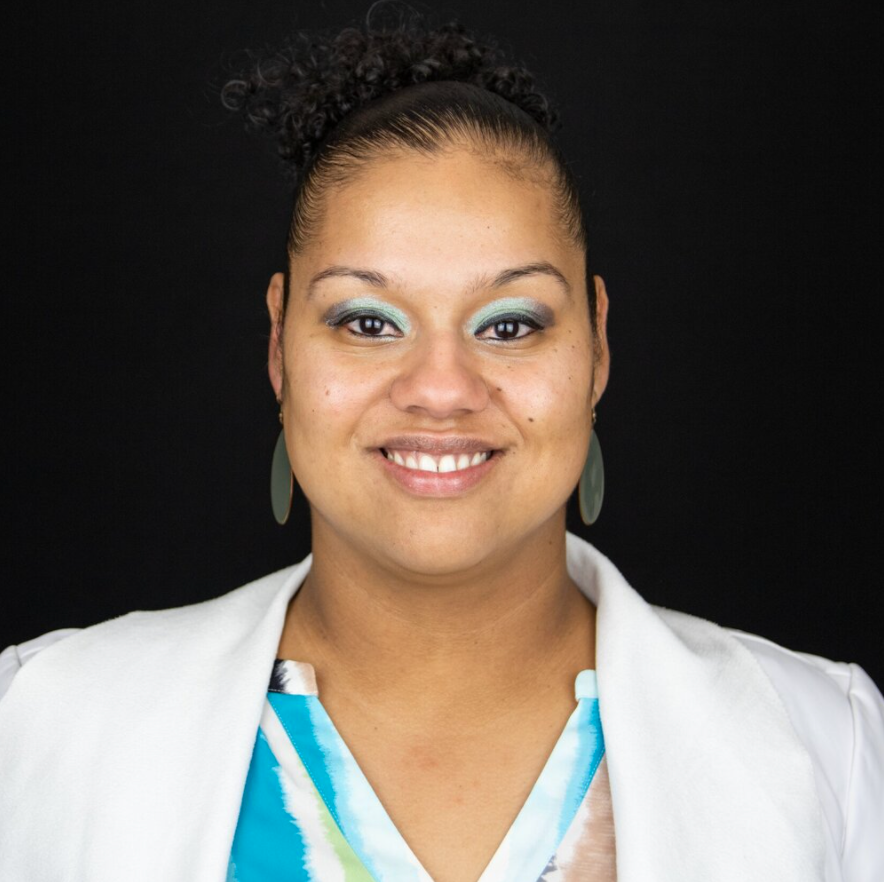Battle over Charters, Providence Takeover Divides Democrats in Deep Blue Rhode Island

A war over education reform is brewing in Rhode Island, and its outcome could have colossal implications for the state’s politics.
Two years after then-Gov. Gina Raimondo announced a sweeping takeover of Providence Public Schools, citing widespread academic failure and frequently unsafe learning conditions, the city’s powerful teachers’ union is demanding a new contract and a return to local control. At the same time, state authorities are deadlocked over whether to hasten or restrict the growth of local charter schools.
The multi-pronged conflict has already scrambled traditional partisan allegiances in one of the bluest states in the country. Democrats in the legislature, including members of the leadership, overwhelmingly passed a three-year moratorium on new charter schools out of the state Senate in February. The bill is still being considered in the House, though Gov. Daniel McKee — a longtime school choice advocate who ascended from the lieutenant governorship when Raimondo was tapped to become U.S. Secretary of Commerce — has already promised to veto it. And with McKee angling to fend off Democratic rivals and win a term of his own in 2022, he’ll need to walk the line between wooing urban charter supporters and alienating organized labor. Finding that delicate balance is the same challenge facing the national party, whose policy towards charter schools has been in flux for a decade.
Local pollster Joe Fleming, who has advised McKee in previous elections, said in an interview that he expected voters to judge the governor mostly by his performance in guiding Rhode Island through the vaccination and reopening process, noting that the massive infusion of federal funds from the American Rescue Plan had put him in an enviable position. But he could also face further dissension in his own ranks.
“Obviously, the General Assembly knows that if they pass it, it’s going to be vetoed by the governor,” Fleming said. “At that point, it becomes more of a political decision if they have the votes to override a veto and if they want to go that route. But the unions are really pushing the moratorium, and there are a lot of union-affiliated people in the General Assembly.”
Maureen Moakley, professor emeritus of political science at the University of Rhode Island, said the state’s past and present governors have been notable in pushing for systemic school reform. But the collision of labor woes and the campaign calendar ensure that a treacherous situation is already “coming to a head,” she added.
“It’s a small state — we don’t even have counties — and if enough people get behind [reform], it’s manageable. But a lot of people don’t want to mess with the unions, which are a large part of their base. And I think it’s going to be a dilemma for McKee because he’s not going to want to run against teachers.”
The takeover
The current standoff began in 2019, when Raimondo announced that schools in Providence would undergo a state takeover and adhere to new, ambitious performance goals. Angélica Infante-Green, the newly appointed state commissioner of schools, would lead the transformation.
It was a move that many believed was necessary. K-12 schools in Providence — not only Rhode Island’s capital, but also its largest city by far — had been among the state’s lowest-performing for decades, with only a fraction of the district’s students ranking as proficient in English or math. The move was made after the release of a damning report by investigators from Johns Hopkins University, which was commissioned by Raimondo and Providence Mayor Jorge Elorza in response to the district’s disastrous performance on state tests.
“The state decided to take a more drastic action to fix a problem that’s been going on for generations,” said Kenneth Wong, a professor of education policy at Brown University. “It’s controversial, but there’s some key, diverse stakeholders out there that have…gotten frustrated with the pace of improvement.”
But the best-laid plans of the new regime, which began in November of that year, were almost immediately shredded by COVID-19. Almost instantly, the ambitions for improvement needed to coexist with a transition to online learning that would see one-third of the district’s students fall into chronic absenteeism. In a fateful decision, Raimondo pushed forward with one of the most aggressive reopening policies in the country — a strategy that won her some plaudits in national media, but also led to angry calls to return to virtual learning when cases started to rise before the holidays.

Labor unrest posed a separate challenge. Even before the 2020-21 school year began, the local teachers’ contract expired. Because of the takeover, the Providence Teachers’ Union entered negotiations with Infante-Green and new Providence Superintendent Harrison Peters. Months later, the opposing sides have not reached an agreement. In fact, according to Boston Globe reporter Dan McGowan, they actually meet in separate rooms, using a retired judge as a mediator to shuttle proposals back and forth.
Relations between the union and education authorities had already deteriorated by late March, when the district sent displacement notices to nearly 300 of its employees. In response, the union overwhelmingly passed a vote of no confidence in Peters and Infante-Green, and organization head Maribeth Calabro, a longtime veteran of reform battles, accused Infante-Green of lying and manipulating the public. (Calabro did not respond to a request for comment.)
In a joint statement to The 74, Infante-Green and Peters reiterated a previous call for the two sides to settle the terms of the new contract through public negotiations if necessary, arguing that more educational progress had been made since the state-led reform began than in the decade previous.
“When the Johns Hopkins report was released less than two years ago, PTU leadership stood with us in calling for change,” the statement reads. “When the state intervention began a year and a half ago, PTU leadership stood with us in calling for change. We know that the current union contract is broken. We also know that it’s easy to support change when it’s just an idea.”
The takeover, which is projected to last at least five years, doesn’t appear to have lost much political steam. Several leading contenders to become mayor of Providence — Elorza, unable to seek a third term, is strongly considering a run against McKee for the Democratic gubernatorial nomination — have said they favor continuing the takeover as long as is necessary.
The University of Rhode Island’s Moakley added that the dissatisfaction with the performance of schools across the state is shared by families, especially those in Rhode Island’s diverse cities, and has driven many to look for alternatives.
“There’s also tremendous dissonance coming from minority communities,” she said. “They’ve become empowered over the past decade, and their question is, ‘Are you going to fix these schools? Because in the meantime, my kid is going to be in and out.’ And so many are backing the charter school movement.”
Charter unrest
The formation of a new pro-charter advocacy organization, Stop the Wait, is perhaps a reflection of that unrest. The 501(c)(4), which says it has already attracted over 400 parent members, is sending mailers to state legislators in a furious attempt to block the proposed charter moratorium.
Stop the Wait board president Janie Segui Rodriguez, an employee at the Achievement First charter network and an experienced activist, helped found the group after losing a city council election in her hometown of Pawtucket by just two votes last year. She said that while the situation in Providence schools has gained national attention, other cities across the state are in desperate need of better options.

“No one talks about Pawtucket, they’re always talking about Providence,” Rodriguiez said.
“But the schools here are no better. I live like two minutes from Providence, and this has been happening for generations.”
As the 2019-20 school year was beginning, over 10,000 families competed in lotteries for 1,800 available charter school seats across the state. In his own review of state academic data, Wong said he’d found that third- and fifth-graders at Rhode Island charter schools had outperformed their peers at traditional public schools in both math and English test scores. Still, he noted, the scope of the sector — just 32 charters educating about 10,000 students — was quite limited compared with bigger states and cities.
“In the scheme of things, we’re not talking about New Orleans, or Chicago, or Washington, D.C. This is fewer than 10 percent of kids statewide who are actually going to charter schools.”
Whether that remains the case is still to be determined. In December, at the urging of Infante-Green, members of the state Council on Elementary and Secondary Education green-lit a sizable scaling-up of existing Providence charter schools while also accepting proposals from three new charter operators. If enacted, the expansion would create almost 6,000 new charter seats by the end of the decade. Almost immediately, however, the Democratic House speaker called for a “pause” in further growth, potentially including the schools already approved.
The idea was echoed by other senior Democrats in the legislature, who argued that such swift expansion would destabilize the finances of traditional public schools in the short-term, costing them as much as $90 million. It was a case that proved persuasive to members of the state Senate, which passed a three-year moratorium on charter expansion by a vote of 30-6; just one Democrat voted against the bill, which is now under consideration in the state House of Representatives.
That potentially puts McKee in an awkward position. He had made his reputation in part by successfully advocating for the introduction of the “mayoral academy,” a type of charter established by municipal leaders and run through nonprofits. In the first major offensive of his governorship, he has campaigned openly against a moratorium and pledged to veto it if the House sends it to his desk.
If that threat hangs over the state House as it considers the moratorium legislation, so does the possibility of a backlash from voters. A March poll of 650 Rhode Islanders commissioned by Stop the Wait found that 53 percent favored the further expansion of the state’s charter sector. Another survey, this one conducted by Roger Williams University’s Latino Policy Institute, found that large majorities of Latino parents in Providence also backed expansion.
If House Democrats defy McKee in passing the proposal, the governor will have six business days to decide whether to veto. It would take only 60 percent of members to override, and judging from the huge margins that supported the moratorium in the Senate, that is an obstacle that could be overcome. But doing so would put Democratic members in open revolt against a Democratic governor at the onset of a long campaign season that will determine the state’s political leadership for years to come.
In the meantime, Rodriguez said her group had been inundated with donations and offers of support, and that she was in talks with potential funders at both the local and national levels. But she said she was unsure of whether the favorable response she’s seen will translate into political action, either now or in elections next year.
“It’s actually been shocking to me how many people, behind closed doors, support charter schools. But I don’t know if it’s their make-or-break issue where they’ll break from a candidate, because it’s not impacting their children.”
Get stories like these delivered straight to your inbox. Sign up for The 74 Newsletter

;)

